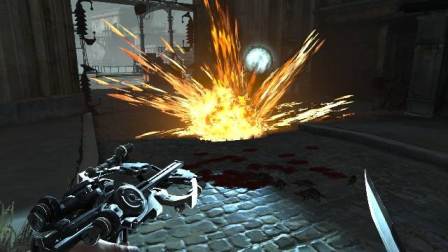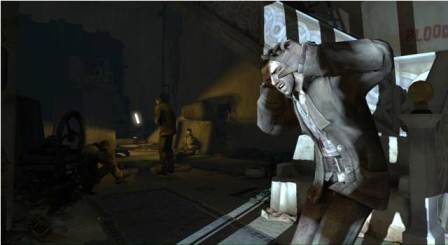CHICAGO – In anticipation of the scariest week of the year, HollywoodChicago.com launches its 2024 Movie Gifts series, which will suggest DVDs and collections for holiday giving.
Video Game Review: ‘Dishonored’ is at War with Itself
CHICAGO – I’m more or less “over” the whole killing evil aristocrats thing. Between “Skyrim”, “Assassin’s Creed”, “Mount and Blade”, “Ultimate” and dozens of other games that take place in some sort of medieval setting, I think I’ve killed every Lord, Duke, and Earl in Europe. And, to be honest, it’s getting a bit old, folks. So, it was with some trepidation that I approached “Dishonored,” yet another game set during a time of evil aristocracy where the noble lords and leaders wipe their proverbial boots on the actual faces of the great unwashed masses and (*sigh*) it’s up to you to right the wrongs.
 Video Game Rating: 3.5/5.0 |
The setup could come from a middle-ages epic: You’re Corvo, protector of the Empress and her daughter, Emily. After returning early from a failed mission to get to the bottom of a terrible plague sweeping the city, you’re ambushed by a group of evil ninja looking fellows, who kill the Empress, kidnap Emily, and frame you for the crime. You’re thrown in prison, but before you know it you’re making a daring escape with the help of some shadowy figures who want to put young Emily on the throne, and save the city from turning into a vile cesspool - one target at a time. From there you’re taken by boat to a quaint little town where you begin meeting the game’s supporting cast. It was at this point I was prepared for a middling first-person action/adventure game that borrowed heavily from “Assassin’s Creed,” and would be an enjoyable but derivative jaunt for fans of that particular game and genre. Which I am not. Instead I got a loyal golden retriever that occasionally pees on the carpet.

Dishonored
Photo credit: Bethesda
Corvo is the gaming equivalent of an over powered ’90s super-hero. Corvo’s got the best gadgets — a gun, a sword, a crossbow, a mask that looks like a skull, and incredible magical powers like teleportation, the ability to possess other people, leaping high distances, and see in the dark. You also have a sword. It seems a little pointless all things considered, but melee combat is a blast, with RB being block and RT for attack. Sure, it’s nothing revolutionary, but combat is weighty and satisfying, and a well timed block/counter attack combo is rewarding.
 Dishonored Photo credit: Bethesda |
You have access to a variety of secondary weapons too, be it a crossbow, gun, or the coolest item in Corvo’s arsenal, a talking biomechanical heart that points Corvo in the direction of Runes and Bone Charms, which are used to level up abilities and modify your skills. The neat thing about this heart is that you can point it at various NPCs to hear their innermost thoughts - it’s a neat touch that doesn’t serve a specific purpose in gameplay, but is really cool nonetheless.
The name of the game in “Dishonored” is options - most games this generation have focused on providing you the wide-open sandbox, “Dishonored” instead offers you a jungle gym. On any given mission, you’re given a target to take out, and have a variety of ways to accomplish it. The first mission tasks you with killing a corrupt politician (or general, or senator, or nobleman or something, the hierarchy of the empire is all over the place…) and there are a few interesting ways to do it. Early in the mission you catch wind another nobleman (or general) is to be poisoned. Once you infiltrate the meeting room, you can switch out the poison, thus killing the guy you’re supposed to kill completely unseen, before sneaking down from your vantage point to obtain his journal. This is a truly harrowing experience and these sorts of events are found all over “Dishonored”.
 Dishonored Photo credit: Bethesda |
Another great example finds you tasked with killing two evil brothers who are holed up at a brothel. At the start, an NPC named SlackJaw says that if you infiltrate the brothel and obtain a safe combination from a patron there, he’ll dispose of the brothers without you having to get your hands dirty. I obtain the safe combination, kill the brothers anyway, raid the safe, then return with the combination for SlackJaw. He’s bemused that I’ve returned the safe combination despite me having killed the brothers, but is grateful for the combination. First it was awesome that the game recognized the two brothers were already dead, second it was great I was able to use said combination on the safe in question, and third, it turns out there was an XBox achievement for having pillaged the safe before giving SlackJaw the combination. These sorts of considerations are worth the price of admission alone, especially as the majority of major releases skew more and more toward linearity.
The remainder of the game, however, can be frustrating - this is where the pee on the carpet comes in. There’s a weird risk/reward morality system going on, where the less you kill people, the better the ending of the game will be. The problem is that this non-lethal approach to morality is haphazard. The idea is to earn a low “Chaos” rating for each of the missions. The more chaos you cause, the worse the city will become - more rats, more plague-infested humans, more guards, etc. However, outside of a few toys in your arsenal, it’s difficult to avoid violent conflict once spotted. Worse, sometimes your character is ambushed and you *have* run away due to the fear of killing enemies and raising the chaos level. It’s just odd that the game would give you all of these options for disposing of your enemies, then punish you for using them to the best of your ability.
 Dishonored Photo credit: Bethesda |
The plot of the game is spread out amongst so many different media (journals, overheard conversations, audio logs) that anything close to a cohesive narrative is lost. With John Slattery, Lena Headey, Chloë Grace Moretz, Susan Sarandon, Michael Madsen, Carrie Fisher, and Roger L. Jackson (the voice of the killer in “Scream”!) lending their pipes and credibility to the proceedings, it’s a shame the story never feels compelling or all that important. If you come across a journal or a book, you must stop and read it, no narration. If you come across two NPCs having a conversation about an important character, you must, again, stop in your tracks and listen, and because you’ll likely be behind cover at the time, staring at the same cardboard box for 30 seconds gets boring. You’ll also consistently feel like you’re missing something, because a scripted event is happening somewhere off-screen, or you accidently alert a guard who was in the middle of rattling off important expository dialog - you eventually just stop caring enough to stop and read everything.
If I were to sum up “Dishonored” in one word, it’d be conflict. Developer Arkane Studios have poured a plethora of creative ideas and features into this game. You get the combat from “Skyrim”, “Arkham City’s” detective vision, an “Assassin’s Creed” style setting and gameplay, the stealth from “Deux Ex: Human Revolution”, a cartoony visual aesthetic that “Fable” fans will fondly remember, and the random junk collecting from “Fallout 3”, but it never peaks, and you’re not sure why. It’s almost as if the game is fighting itself. “Dishonored” is a game where the combat is fun, but the game dissuades you, even punishes you for it at every possible turn. Corvo’s powers are cool, but it feels like the developers gave him very little rhyme or reason as to why he’d have them. You can see through walls but it’s impossible to tell which way a guard is facing. All those big name voice actors are cool, but they’re useless if they 1) Can’t act or aren’t given direction and 2) aren’t given attention in the opening credits of the game.
But, man, when this game works, it works. And it’s the kind of enjoyment that’s terrifically hard to describe unless you experience it, and even though some elements of the game are derivative, if you’re willing to forgive a few big failings, you’ll find out there’s really nothing else like it out there.
By Paul Meekin
Staff Writer
HollywoodChicago.com


